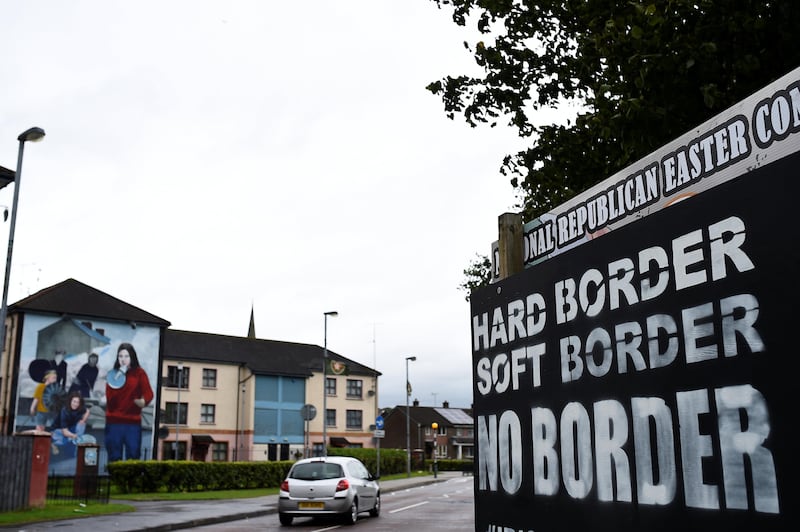There will be no return to a hard border between Northern Ireland and the Irish Republic, according to a position paper released by the British government on Wednesday.
The United Kingdom remains committed to no physical infrastructure separating the two countries.
Northern Ireland is the only area of the UK which shares a contiguous border with an EU country. But with the province's recent history of terrorism followed by an uneasy peace, it has been a prime concern to many that Brexit may reignite sectarian issues which have been long dormant.
The British government says it remains deeply committed to upholding the Good Friday agreement, or Belfast Agreement, which was signed and ratified after decades of violence between unionists, who wanted Northern Ireland to remain part of the UK, and nationalists, who wanted a united Ireland.
The government also insists that the Common Travel Area - which has existed since 1923 and ensures minimal controls between the two countries - and the associated rights for UK and Irish citizens will continue to exist.
___________
Read more:
Hard or soft border: UK faces two options after Brexit
___________
"In committing to keep the Common Travel Area, which has existed for nearly a century, we're making sure UK and Irish citizens will continue to be able to travel, live, work and study across both countries," said secretary of state for exiting the EU, David Davis.
The paper maintains there will be no infrastructure at the border, which means there will be no border posts or checks on transport going across the divide.
"As Michel Barnier [the EU's chief Brexit negotiator] himself has said, the solution cannot be based on a precedent so we're looking forward to seeing the EU's position paper on Ireland," a government source told The Guardian.
“But it’s right that as we shape the unprecedented model, we have some very clear principles. Top of our list is to agree upfront no physical border infrastructure – that would mean a return to the border posts of the past and is completely unacceptable to the UK.”
“The UK and Ireland have been clear all along that we need to prioritise protecting the Belfast Agreement in these negotiations, and ensure the land border is as seamless as possible for people and businesses," Mr Davis said.
“The proposals we outline in this paper do exactly that, and we’re looking forward to seeing the EU’s position paper on the Northern Ireland border," he said.
The agreement also recognises that people from Northern Ireland will continue to have — as set out in the Belfast Agreement — a birthright to both Irish and British citizenship. That means anyone in Northern Ireland who is an Irish citizen will continue to benefit from the EU citizenship rights that flow from that.
_________________________________________________
Read more:
[ UK may not be able to strike trade deals with non-EU countries for three years after Brexit ]
[ UK opts for ‘hard Brexit’ in split from EU ]
_________________________________________________
"This paper shows the government’s commitment to protecting and advancing the unique interests of Northern Ireland as we leave the EU. We are fully committed to the Belfast Agreement, and the principles, rights and institutions it established,” the secretary of state for Northern Ireland James Brokenshire said.
“I believe it is possible to find a solution that works for the UK, for Ireland and for the EU - and, specifically, for Northern Ireland - and am determined to work to achieve that," he said.
“It is clear that there are many areas where the UK, Ireland and the rest of the EU have shared objectives. We have a lot to build on but need to work together intensively over the coming months.”
Reaction to the proposals was mixed.
Irish foreign minister Simon Coveney said the paper provided "much needed clarity", especially regarding the commitment to uphold the Northern Ireland peace process and retaining freedom of movement across the border.
But "we are not going to be used as a pawn here in any bigger negotiation", he warned.
Opposition Labour party’s Northern Ireland spokesman, Owen Smith, said: “The government say they want trade across the Irish border to be frictionless and seamless, but actually they look clueless as to how they’re going to achieve that.”
“Producing this paper in the absence of a Northern Ireland executive with no substantive consultation with any of the Northern Ireland parties further damages the ability of the British government to resolve the impasse in Northern Ireland,” Mr Smith said.
Claire Hanna, from the Social Democratic and Labour party, a nationalist organisation, said Britain’s stance was a case of “wanting the cake and eating it”.
“Northern Ireland’s unique circumstances must be understood. The best way to protect our economy and insulate people from the worst aspects of this disastrous decision is to maintain access to the single market and customs union. Ireland cannot be a casualty of the myopic anti-Europe agenda in Britain,” she said.






